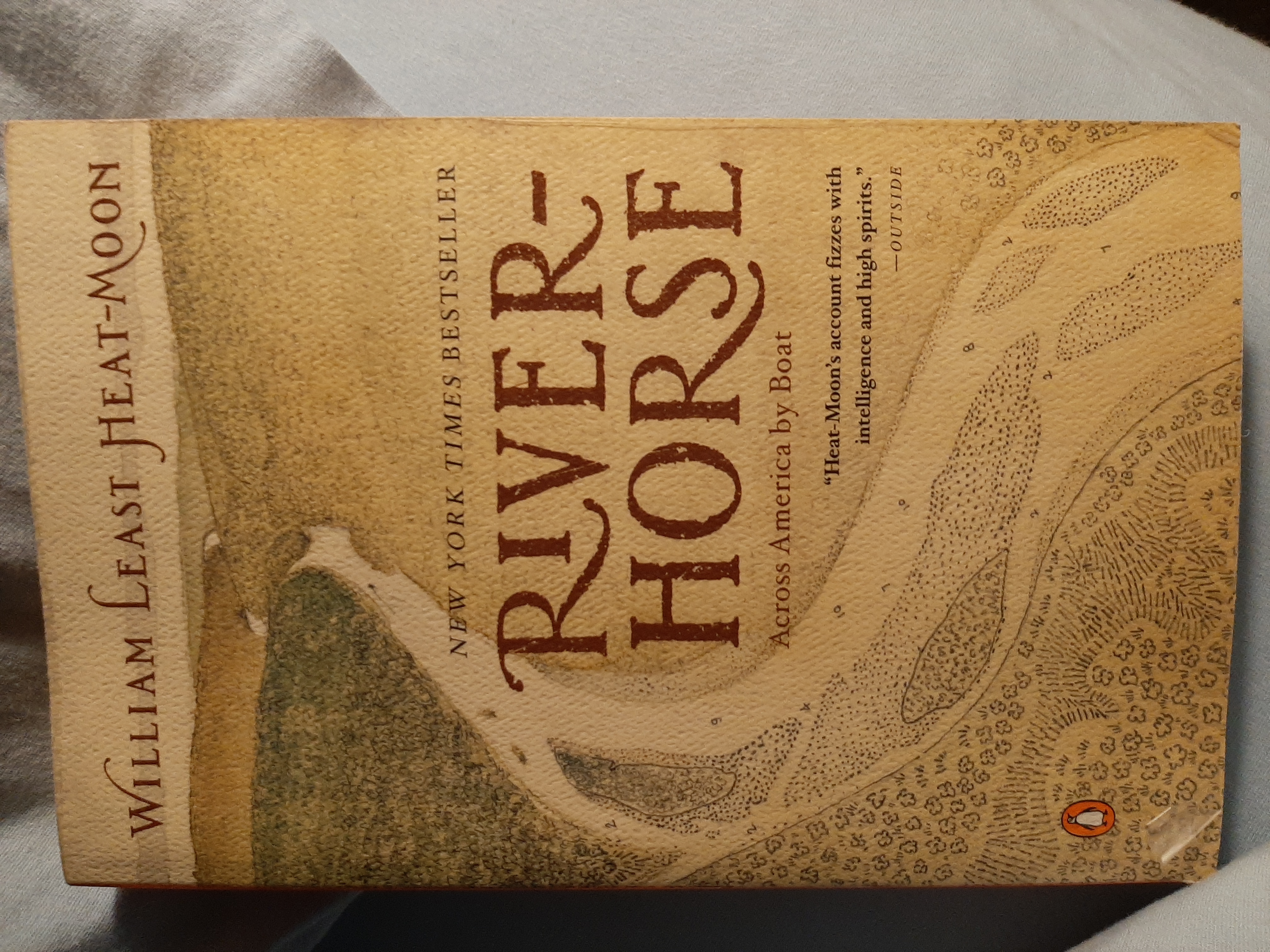Have you ever reached for a book on your shelf and muttered to yourself, “I’ll read that later”? Of course you have. I certainly have, as well. But, sadly, sometimes “later” never arrives, and one day, the unread book is donated or given to a friend never to return. So I decided to simply read all the books lingering on my shelf–those I’d kept over the years because I actually did want to read them. I really did.
River-Horse: Across America by Boat written by William Least Heat-Moon was published in 1999. My note to self on the inside cover was dated 2004. And yes, it’s now April of 2021, but I’ve almost reached page 506 where the arduous, but rewarding, journey across America comes to an end. Predictably, after so many tedious years of procrastination, I’m sorry to say that River-Horse is coming to a close.
When did I begin the book? Back in the fall, believe it or not, and by staying true to my goal of “slow reading” at night, I’ve enjoyed the lengthy book in very small doses. At a snail’s pace on purpose.
If you imagine a Maine lobster boat crossed with a turn-of-the-century harbor tug, you have our C-Dory, Nikawa, a name I coined from the Osage words ni, river, and kawa, horse, and pronounced Nee-KAH-wah. Indeed, she was a tough but sweet little river horse. — William Least Heat-Moon
Reading at night before sleep, I prefer the ponderous book: the multi-dimensional story that embodies the human condition, an author who isn’t afraid to let the book unravel at its own pace. One that is easy to pick up the next night with a sense of curiosity, one I truly look forward to reading. And one with passages worthy of reflection.
Fortunately, this was the perfect book for my desired pace.
Traveling with the author across the entire country was wonderful because I didn’t have to experience it firsthand (I’m not a big traveler). And I could ponder certain sentences as long as I wanted to, finish a chapter totally at my leisure. It’s a new skill for me. I used to believe a book should be read at a hardy gallop. Swiftly, as though worthy of my time. It seems that our culture promotes this kind of “rapid thinking.” This strange need to do everything in a rush as though running is the only way through life. There is also a notable cultural worship for books that are deemed “page turners.” You know, bestsellers that are best gobbled up over lunch, a weekend at the most.
After all, why read slowly, deliberately, and mindfully?
“I think it an invaluable advantage to be born and brought up in the neighborhood of some grand and noble object in nature: a river, a lake, or a mountain. We make a friendship with it; we in a manner ally ourselves with it for life.” — William Least Heat-Moon, River-Horse: A Voyage Across America
But there are other reasons I enjoyed River-Horse so much after letting it idle on my book shelf for 16 years. With best intentions I’d opened the book before, several times, in fact. Went to page one, began reading; yet, during those failed attempts I either found it “boring” or “tedious” or “somehow not relevant to my world and interests.” What nonsense! It’s only now that I’m able to see that I was blaming the book instead of myself. It simply wasn’t the right time for me; I hadn’t grown into a place that allowed the story to fully resonate with me, that helped me embrace the “R-H” journey in meaningful ways.
This reality dawned on me as I was reading River-Horse one night and encountered this thought.
” … he could never see the outcome of his preparations, unless somewhere, on some far side, time permits us to meet our past selves, all those we have been. Our physical components change every seven years, so our brains are continuously passing along memories to a stranger; who we have been is only a ghostly fellow traveler. As for me, what might I learn from him who laid out the voyage or from all those others I once was?”
In a chapter called “Flux, Fixes, and Flumdiddle,” Heat-Moon was reflecting on the person he was when he planned the cross-country journey in Nikawa v. the person he’d become during the journey. Somehow we go through life thinking we’re always the same person, which of course we are in many ways. But, conversely, we forget that we’re constantly growing and changing and adapting, and the person we once were, in all reality, no longer exists.
So if a book doesn’t grab you when you dig in, remember, it may not be the book at all. It may be you.
Maybe you need more time to appreciate a story, more life experience to understand a story, or indeed, more growth and patience to stay with a story. And if a book really gives you trouble, try the slow-reading approach. Makes a huge difference. What doesn’t appeal in large chunks, may definitely appeal in small doses. Experiment. Discover exactly what reading speed is comfortable for you; see if the material is quietly suggesting a reading approach to match the tone and message of the book itself.
I wrote about the merits of slow-reading in the context of another book I’d put off reading: Robert Pirsig’s Zen and the Art of Motorcycle Maintenance. You can find my article (“Alive and Well“) from October 11, 2019, on Brevity’s nonfiction blog described as “(Somewhat) Daily News from the World of Literary Nonfiction.”
As I wrote in the article …
“Especially when making seemingly innocuous choices, I avoid mainstream currents by noticing what feels meaningful, as opposed to traditional and automatic. I read slowly, for instance, with intention, books I’ve carefully, or carelessly, sidestepped.”
Of course I noticed that both of these books were about long journeys across our country. There must be a connection between slow-reading and travel that I enjoy. But my latest experience with Heat-Moon’s book about seeing America by boat despite the difficulty of the journey also illuminated and confirmed my suspicions that books we casually reject one day may become treasures we turn to more than once for inspiration, a sense of intrigue and adventure, and even as reminders of our own personal growth.
I’m not sure what I’ll read next. But I know it will be a book that is fully rested. One that has been patiently collecting dust for a good number of years just waiting for me to pick it up once more and begin again. ~
Blog by SUNNYROOMSTUDIO: All Rights Reserved
Thank you for visiting.


